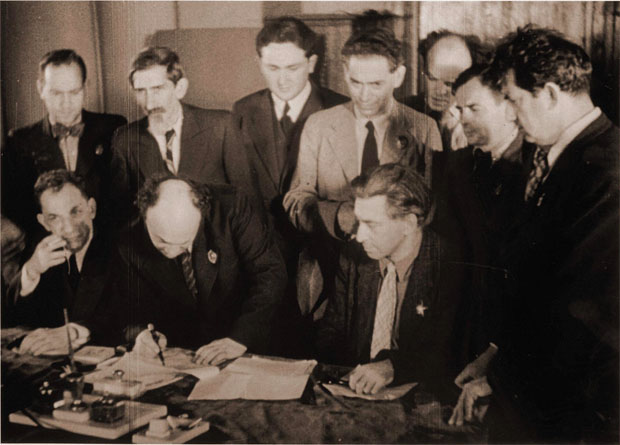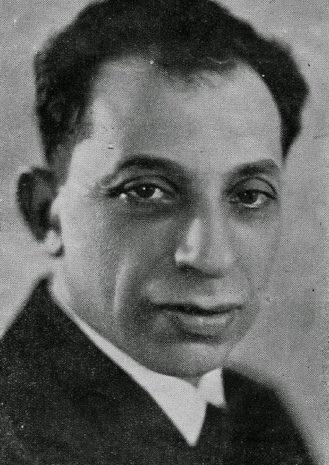Bergelson, David
Bergelson, David or Dovid [Берґельсон, Давид], b 12 August 1884 in Okhrimove, Uman county, Kyiv gubernia, d 12 August 1952 in Moscow. Yiddish writer and literary figure. Born into a prosperous Hasidic family, he was forced to leave his home following the death of his mother in 1898 and reside with his older siblings in Odesa, Kyiv, and Warsaw. In 1903 he settled in Kyiv. Twice an external student at Kyiv University—in 1901 and later, in 1907–8—he eventually abandoned formal studies without obtaining a diploma. His literary endeavors began in Hebrew, but he later shifted focus to Russian. Initially, his Yiddish stories were considered ‘too modern’ by Yiddish publishers, but in 1909 he achieved success with the publication in Warsaw of his novella ‘Arum vokzal’ (At the Depot). In the following years, he continued to publish his works in various periodicals. In 1913, Bergelson began working as editor of the literary section of the Vilnius-based journal Di yidishe velt, where he showcased some of his early fiction and penned his first publicistic essays. In the same year, his first novel, Nokh alemen (When All is Said and Done), was published. In 1917 Bergelson lived in Odesa, and in 1919 he moved back to Kyiv, where he worked in the Kultur Lige and served as an editor of the literary miscellany Eygns, in which he published two works: Yoysef Shur (1913) and Opgang (Descent, 1921). By 1920–1 he had briefly served as a literary editor in the Jewish section of the Communist Party of the Soviet Union in Moscow, aligning himself with the political forces of the time.
In 1921 Bergelson settled in Berlin, where he published the first edition of his collected works and contributed to the New York-based Yiddish newspaper Forverts. In Berlin he also edited, together with Der Nister, the literary section of the magazine Milgroym. In 1926 he made a significant shift in his career when he aligned himself with the pro-communist publication Frayhayt, a rival to the Forverts. He published there a pro-Bolshevik story titled ‘Hersh Toker.’ Following this, he returned to the Soviet Union, assuming the role of a journalistic representative of Frayhayt. His mission was to report on the evolving developments in the country.
As part of his work, he journeyed from Moscow to the Crimea, where the Soviet government was supporting Jewish settlements, potentially laying the groundwork for a Jewish territorial autonomy. In his detailed account of the settlers in the Crimea, simultaneously published in both Frayhayt and Der emes in September 1926, Bergelson took a critical stance against Zionist-oriented migrants. He scrutinized those who utilized the new colonies primarily as transit points on their way to Palestine, emphasizing this point in his writings.
Between November 1928 and May 1929, Frayhayt sponsored Bergelson for a six-month tour of the United States of America. Following this tour, Bergelson continued to reside in Berlin for another three years, until the rise to power of Adolf Hitler and the Nazis. In 1933 he briefly relocated to Copenhagen before ultimately returning to the Soviet Union in 1934. His life and career underwent significant shifts during these years, reflecting the tumultuous historical backdrop of the time.
To adapt to the political climate in the Stalinist USSR, Bergelson published the pamphlet ‘Birebidzhaner’ (Moscow, 1934), presenting a reportage-style narrative about the Jewish autonomous region of Birobidzan, based on his seemingly positive impressions of the region. Another notable work in this time was his quasi-autobiographical novel Baym Dnyepr (By the Dnipro River, 1929–32), originally intended as a five-volume saga but ultimately comprising only two volumes: Penek (1932) and Yunge yorn (Early Years, 1940).
During the turbulent times of the Yezhov terror of 1937, Bergelson, like many others, found himself endorsing the purge trials and condemning the defendants from Birobidzhan. In 1942, he became part of the Jewish Anti-Fascist Committee (JAFC) and contributed to its Yiddish newspaper, Eynikayt (Unity), focusing on the survival of the Jewish people in the midst of the Holocaust. His stories in response to these events were published as Geven iz nakht un gevorn iz tog (Night Fell and Day Followed, 1943), with another volume titled Naye dertseylungen (New Stories, 1947).
In 1948 the JAFC and Eynikayt were closed down, signaling the onset of a grim era for Yiddish cultural institutions. During the postwar Stalinist purges of Jewish culture in the Soviet Union, Bergelson was arrested in January 1949. Alongside other notable Jewish figures, such as David Hofstein, Leib Kvitko, Perets Markish, and many others, he spent over three years in prison before facing trial in May 1952. Charged with capital offenses, Bergelson was among thirteen defendants sentenced to death by execution. He was executed in the Lubianka Prison in Moscow during what is sometimes referred to as ‘the Night of the Murdered Poets.’
BIBLIOGRAPHY
Krutikov, Mikhail. Yiddish Fiction and the Crisis of Modernity, 1905–1914 (Stanford 2001)
Rubenstein, Joshua; Naumov, Vladimir (eds). Stalin’s Secret Pogrom (New Haven 2001)
Sherman, Joseph; Estraikh, Gennady (eds). David Bergelson: From Modernism to Socialist Realism (Leeds, 2007)
Murav, Harriet. David Bergelson’s Strange New World: Untimeliness and Futurity (Bloomington 2019)
Larysa Bilous
[This article was written in 2023.]


